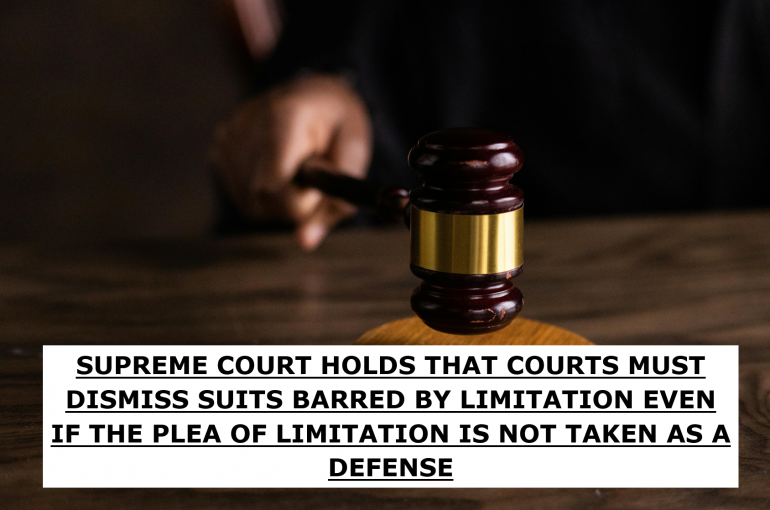SUPREME COURT HOLDS THAT COURTS MUST DISMISS SUITS BARRED BY LIMITATION EVEN IF THE PLEA OF LIMITATION IS NOT TAKEN AS A DEFENSE
A two Judge Bench of the Hon’ble Supreme Court comprising of Justice B.R Gavai and Justice Sandeep Mehta passed a judgement dated 16.04.2024 in S. Shivraj Reddy (Died) through His LRs. and Another v. S. Raghuraj Reddy and Others SLP Civil no. 4237 of 2015 wherein the Apex Court held that even if the plea of limitation is not taken up as defense, the Courts have the duty to dismiss the suit barred by limitation.
Facts
The facts of the case depict that the Plaintiff/Respondent herein along-with the Defendant No. 2-4 had constituted a Partnership Firm namely “M/s Shivraj Reddy & Brothers” (Firm) for construction of buildings on contractual basis. The Plaintiff instituted a Suit bearing no. O.S. No. 67 of 1997 seeking relief of dissolution of the Firm and rendition of accounts.
The Ld. Additional Chief Judge, City Civil Court, Hyderabad (Trial Court) allowed the Original Suit and passed a Decree dated 26.10.1998, declaring the Firm to be dissolved and directed the Defendants to tender accounts of the Firm from the year 1979 onwards till October 1998. It further granted liberty to the Plaintiff to file a separate application seeking appointment of an Advocate Commissioner for taking accounts of the Firm and for other appropriate reliefs.
Being aggrieved by the said Order dated 26.10.1998 of the Ld. Trial Court, Defendant No. 1 and 2 i.e. M/s Shivraj Reddy & Brothers and Late S. Shivraj Reddy filed an Appeal bearing no. CCC. Appeal No. 35 of 1999 in the High Court of Andhra Pradesh. The Hon’ble High Court allowed the Appeal vide Order dated 19.10.2001 on the ground that the O.S. No. 67 of 1997 filed in the Trial Court was barred by limitation because one of the partners namely Shri M. Balraj Reddy expired in 1984, therefore the Firm stood dissolved immediately on the death of the Partner. Since the Original Suit was filed in 1996, it was barred by limitation.
Later, another Appeal was filed in the Division Bench of the Andhra Pradesh High Court by the Respondent/Plaintiff bearing no. LPA No. 47 of 2002 challenging the Order dated 19.10.2001 passed by Single Judge Bench. The Division Bench vide Order dated 27.03.2014 observed that the plea of limitation was never raised during the pleadings in the Ld. Trial Court and Ld. Single Judge ought not to have dealt with that issue at all and hence the Order of the Single Judge Bench was set aside.
Thus, again the Defendant No. 1 and 2/Appellants, challenged the Order dated 27.03.2014 passed by the Division Bench in the Supreme Court of India.
Issues
If the defense of Limitation is not taken by any party, then Courts have the power to dismiss the case because it is barred by limitation?
Decision of Supreme Court
The Supreme Court in view of the above facts observed as follows-
“The fact that the Firm-Defendant No.1 namely “M/s Shivraj Reddy & Brothers”, was a partnership at will, is not in dispute. It is also not disputed that one of the partners of the Firm, namely, Shri M. Balraj Reddy expired in the year 1984. This event leaves no room for doubt that the partnership would stand dissolved automatically on the death of the partner as per Section 42(c) of the Act.”
The Hon’ble Court emphasized that the question of limitation in this case is a pure matter of law rather than a mixed question of fact and law, given the fact of one of the partners’ death is undisputed.
The Apex Court also noted that the statute of limitations for filing a suit for rendition of account is three years from the date of dissolution, and in this case, the Firm dissolved in 1984 due to the death of one of the partners, so the Suit could only have been filed within three years of that event.
Thus, the Apex Court observed that the reasoning given by the Division Bench stating that the Single Judge Bench ought not to have considered the question of limitation was completely erroneous.
The Hon’ble Supreme Court relied on the judgement of V.M. Salgaocar and Bros. v. Board of Trustees of Port of Mormugao and Another (2005) 4 SCC 613, wherein the Apex Court held as follows:
“20. The mandate of Section 3 of the Limitation Act is that it is the duty of the court to dismiss any suit instituted after the prescribed period of limitation irrespective of the fact that limitation has not been set up as a defense. If a suit is ex facie barred by the law of limitation, a court has no choice but to dismiss the same even if the Defendant intentionally has not raised the plea of limitation.”
Thus, the Supreme Court stated that it is a settled law that even if the plea of limitation is not set up as a defense, the Court has to dismiss the suit if it is barred by limitation.
Conclusion
The Apex Court allowed the Appeal filed against the Order of the Division Bench dated 27.03.2014 and set aside the said Order stating that the Suit could only be instituted within 3 years of the event of death of a partner. Hence, the Supreme Court held that even if the plea of limitation is not taken by a party, the Courts are bound to dismiss the case on the basis of limitation.
ARJAV JAIN
ASSOCIATE
THE INDIAN LAWYER & ALLIED SERVICES





































Leave a Reply